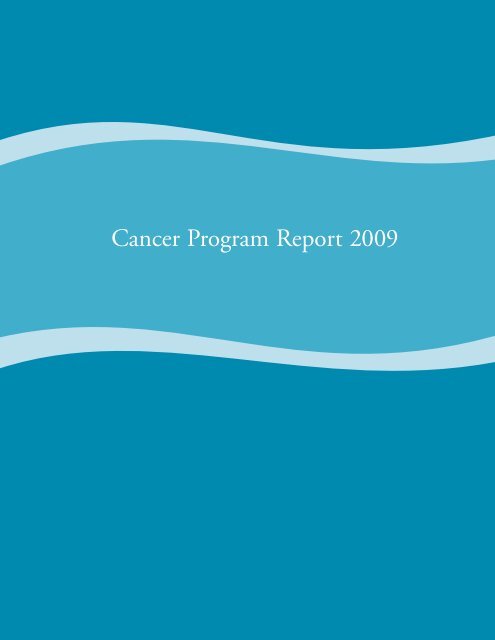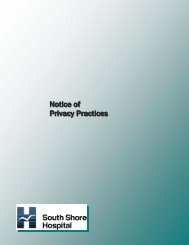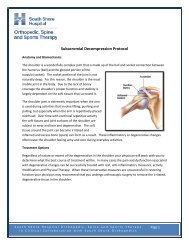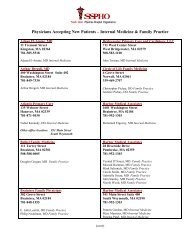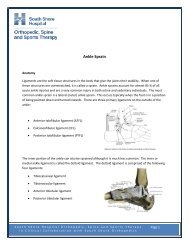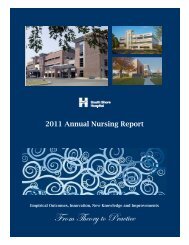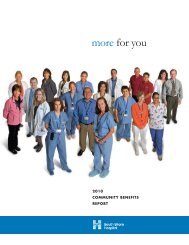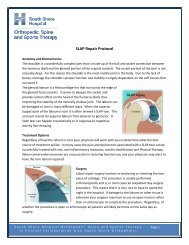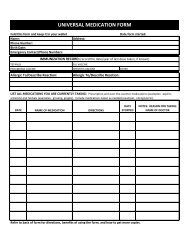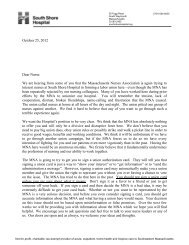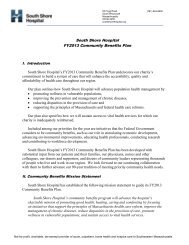cancer care program report - South Shore Hospital
cancer care program report - South Shore Hospital
cancer care program report - South Shore Hospital
- No tags were found...
Create successful ePaper yourself
Turn your PDF publications into a flip-book with our unique Google optimized e-Paper software.
Cancer Program Report 2009
INTRODUCTIONThe vision of the Cancer Program at <strong>South</strong> <strong>Shore</strong> <strong>Hospital</strong> (SSH) is to offer compassionate, comprehensive <strong>cancer</strong> <strong>care</strong> to ourcommunity. Opening the doors of the Dana-Farber/Brigham and Women’s Cancer Center in clinical affiliation with <strong>South</strong> <strong>Shore</strong><strong>Hospital</strong> in the fall of 2009 marks another milestone toward that goal. The new Center, together with the already establishedCommonwealth-Atrius Cancer Center, will provide our patients with state-of-the-art <strong>care</strong> closer to home. Through their <strong>program</strong>s,eligible patients are able to participate in clinical trials through the National Surgical Adjuvant Breast and Bowel Project (NSABP)protocols as well as selected Dana-Farber/Partners and other Boston tertiary <strong>care</strong> center research protocols. Since 1982,<strong>South</strong> <strong>Shore</strong> <strong>Hospital</strong> has maintained continuous accreditation by the American College of Surgeons Commission on Cancer as aComprehensive Community Cancer Program.In addition to the standard complement of diagnostic imaging, <strong>South</strong> <strong>Shore</strong> <strong>Hospital</strong> now boasts endobronchial and endoscopicultrasound capability to permit more precise staging of lung and prostate <strong>cancer</strong> as well as gastrointestinal malignancies.The Breast Care Center continues to offer streamlined <strong>care</strong> from diagnosis to surgery for breast <strong>cancer</strong> patients. Supplementingdigital mammography and breast ultrasound, breast MRI is now available, bringing a new level of imaging sensitivity to breast<strong>cancer</strong> diagnosis.Fellowship-trained breast surgeons bring specialized expertise to the operating table. Chemotherapy is given by dedicatedoncology-certified nurses in both the outpatient and inpatient settings.The practical needs of patients and their families are met through ancillary services. The <strong>South</strong> <strong>Shore</strong> <strong>Hospital</strong> Visiting NurseAssociation and Hospice of the <strong>South</strong> <strong>Shore</strong> extend personalized, professional <strong>care</strong> into the home. Patient support groupsand nutrition counseling are important adjuncts in maintaining emotional and physical well-being during and after treatment.The American Cancer Society provides patient education and access to additional services.The complexity of <strong>cancer</strong> treatment requires <strong>care</strong>ful coordination of the specialists involved. At weekly multidisciplinaryconferences, radiologists, pathologists, surgeons, and radiation and medical oncologists all gather to discuss newly-diagnosedpatient cases. We — the physicians, nurses, registry staff, and dedicated volunteers that make up the Cancer Program —are committed to recognizing each patient as a person, unique in condition and circumstance. We strive to deliver state-of-the-art<strong>care</strong> founded on the cornerstone of communication, comfort, caring and compassion.Carol Mei, MDChairperson, Cancer CommitteeCancer Committee Members 2008Michael Anderson, MDChairmanHematology/OncologyFrank Basile, MDHematology/OncologyBruce Bornstein, MDRadiation OncologyThomas Clancy,MDGeneral SurgeryEdna Donoghue, ACSLudmila Epshteyn, MDPathologyJames R. Everett, MDHematology/OncologyMarykate Falkenstrom, RNVNARolf Freter, MD, PhDHematology/OncologyClaire Fung, MDRadiation OncologyNancy Hinchliffe, RHIA, CTRCancer RegistrarSusan Hollis, LICSWSocial WorkLeslie Leveille, NPBreast Care CenterPatricia Long, RNPerformance ImprovementCarol T. Mei, MDChair, Hematology/OncologySuniti Nimbkar, MDBreast Cancer SurgeryKelly O’Neil, RNRadiation OncologyMekhala Stephen, MDPain ManagementChristopher Ducko, MDThoracic SurgeryMargaret Hill, RNProtocol AdministratorSlobodan Miseljic, MDRadiology<strong>South</strong> <strong>Shore</strong> <strong>Hospital</strong> Cancer Program Report 2009 • 1
CANCER REGISTRY REPORT<strong>South</strong> <strong>Shore</strong> <strong>Hospital</strong>’s Cancer Program is an approved<strong>program</strong> by the American College of Surgeons Commissionon Cancer. We have had the honor of being an approved<strong>program</strong> since 1982.An essential component of <strong>South</strong> <strong>Shore</strong> <strong>Hospital</strong>’s CancerProgram is the database maintained by the Cancer Registry,which is responsible for the collection, management and analysisof data on <strong>cancer</strong> patients. Lifetime medical follow-up of <strong>cancer</strong>patients is encouraged to provide information for epidemiological,clinical and research studies, and educational purposes. TheCancer Registry reference date is January 1, 1995.In 2008, a total of 1,077 newly-diagnosed <strong>cancer</strong> cases wereaccessioned into the registry. To date, the Cancer Registry has atotal of 13,008 cases. Annually, a total of 6,714 cases are followed,which represents the follow-up rate of 90 percent mandated by theCommission on Cancer (American College of Surgeons).Data from the registry has been requested by medical staff andresearchers for use in grant applications, epidemiologicalstudies, and for mortality and morbidity statistics.There were 1,077 new <strong>cancer</strong> cases accessioned in calendaryear 2008. A total of 29.8 percent more women than menwere diagnosed/treated for <strong>cancer</strong> at <strong>South</strong> <strong>Shore</strong> <strong>Hospital</strong>.The average age is over 50 years old. (Figure 1)The next table reflects the five most frequent <strong>cancer</strong>s seenat <strong>South</strong> <strong>Shore</strong> <strong>Hospital</strong> in 2008 and comparestheir frequency with 2008 American Cancer Figure 3: American Joint Committee on Cancer/Tumor, Nodes, Metastases (TNM) StagingSociety (ACS) estimates of cases. (Figure 2)The registry participates in the National CancerData Base (NCDB) call for data, the HarvardSchool of Public Health Women’s Health Study,and the Massachusetts Cancer Registry, as wellas completes independent requests for specialstudies from the information that has beencollected into the registry database.The American Joint Committee on Cancer (AJCC)Tumor, Nodes, Metastases (TNM) staging systemis used to describe the extent of disease spreadof <strong>cancer</strong> and is a valuable indicator of prognosisand survival. The graph at right depicts the AJCCstaging for the top five sites of <strong>cancer</strong> for 2008.(Figure 3)Number of Cases12010080604020Figure 1: <strong>South</strong> <strong>Shore</strong> <strong>Hospital</strong> Cancer Registry Statistical SummaryGender # %Male 379 35Female 698 65Total 1,077 100.0Age Distribution # %0-29 10 0.930-39 35 340-49 129 1250-59 191 1860-69 271 2570-79 244 2380-89 172 1690+ 25 2.1Total 1,077 100.0Figure 2Site SSH ACSBreast 26% 26%Lung 16% 15%Colon 8% 8%Bladder 6% 7%Prostate 5% 25%BreastLungColonBladderProstate0Stage 0Stage IStage II Stage III Stage IVStage at DiagnosisUnknownN/A2 • <strong>South</strong> <strong>Shore</strong> <strong>Hospital</strong> Cancer Program Report 2009
SITE REVIEW OF NON-SMALL CELL LUNG CANCERIncidenceThe <strong>South</strong> <strong>Shore</strong> <strong>Hospital</strong> lung <strong>cancer</strong>population mirrors the national population,with a slowly rising incidence of lung<strong>cancer</strong>. This trend is shown in Figure 1,depicting the number of cases of lung<strong>cancer</strong> diagnosed at <strong>South</strong> <strong>Shore</strong> <strong>Hospital</strong>between 2004 and 2008. A gradually risingincidence of lung <strong>cancer</strong>, from 118 cases in2004 to 174 cases in 2008, is noted.(Figure 1).The data in the figures below demonstratethat the majority of lung <strong>cancer</strong>s aredetected at an advanced stage, i.e. Stage IIIor Stage IV disease, which is less amenableto curative treatment. At <strong>South</strong> <strong>Shore</strong><strong>Hospital</strong>, 69.5% of cases in 2008 weredetected in Stages III or IV (Figure 2A).Nationally, 64.8% of new cases of lung<strong>cancer</strong> were detected in Stages III or IV(Figure 2B).Figure 2A:Stage by Ageat Diagnosis:The stage distributionof lung <strong>cancer</strong>s at<strong>South</strong> <strong>Shore</strong> <strong>Hospital</strong> isshown inFigure 2A.Figure 2A: <strong>South</strong> <strong>Shore</strong> <strong>Hospital</strong> Stage by AgeAge at Diagnosis:Figure 1: Incidence of Lung Cancer 2004-2008Number of Cases200180160140120100806040200118145Lung Cancer2004-2008<strong>South</strong> <strong>Shore</strong> <strong>Hospital</strong>2004 2005 2006 2007 2008163Year of DiagnosisStage 0 Stage I Stage II Stage III Stage IV Unknown N/A Total Percent0-29 0 0 0 0 0 0 0 0 030-39 0 0 0 0 0 0 0 0 040-49 0 3 0 1 0 0 1 5 2.950-59 0 3 2 3 16 0 0 24 13.860-69 0 11 2 11 27 0 0 51 29.370-79 0 11 5 14 26 4 0 60 34.580-89 0 4 0 3 17 5 1 30 17.290+ 0 0 0 0 3 1 0 4 2.3Total 0 32 9 32 89 10 2 174Percent 0 18.4 5.2 18.4 51.1 5.7 1.1 100139174Figure 2B:National Data Stageby AgeThe stage distribution ofpatients nationally is shown inFigure 2B.Figure 2B: National Data Stage by AgeAge at Diagnosis Stage 0 Stage I Stage II Stage III Stage IV Unknown N/A Total Percent0-29 0 2 0 4 6 0 7 19 0.230-39 0 6 4 15 25 2 9 61 0.540-49 0 72 29 127 306 19 22 575 4.950-59 1 320 109 503 843 75 36 1,887 16.160-69 4 787 223 870 1,405 192 44 3,525 3070-79 2 1,007 207 897 1,455 234 57 3,859 32.880-89 1 391 82 432 644 133 14 1,697 14.490+ 0 22 5 33 49 22 0 131 1.1Total 8 2,607 659 2,881 4,733 677 189 11,754Percent 0.1 22.2 5.6 24.5 40.3 5.8 1.6 100<strong>South</strong> <strong>Shore</strong> <strong>Hospital</strong> Cancer Program Report 2009 • 3
Lung <strong>cancer</strong> remains a disease of olderindividuals both at <strong>South</strong> <strong>Shore</strong> <strong>Hospital</strong> andnationally as shown in Figure 2C. The peakincidence of diagnosis of lung <strong>cancer</strong> occursbetween ages 60 and 79. The incidence oflung <strong>cancer</strong> in patients under 60 isconsiderably lower.Figure 3 directly compares the stage atdiagnosis of lung <strong>cancer</strong> in <strong>South</strong> <strong>Shore</strong><strong>Hospital</strong> and national populations. These dataagain underscore that the majority of patientsare diagnosed with Stage III or IV lung <strong>cancer</strong>s.Figure 2C: Age at DiagnosisPercent353025201510National<strong>South</strong> <strong>Shore</strong> <strong>Hospital</strong>A gender comparison of patients diagnosedwith lung <strong>cancer</strong> is shown in Figure 4.Both at <strong>South</strong> <strong>Shore</strong> <strong>Hospital</strong> and nationally,the incidence of lung <strong>cancer</strong> is approximatelyequal between males and females, likelyreflecting the increased smoking rates infemales over the last several decades.500-2930-39 40-49 50-59 60-69 70-79 80-89Age at Diagnosis90+Figure 3: Stage at Diagnosis605040National<strong>South</strong> <strong>Shore</strong> <strong>Hospital</strong>Percent3020100Stage 0Stage IStage IIStage IIIStage IV UnknownN/AStage at DiagnosisFigure 4: Gender Comparison6050MaleFemalePercent403020100<strong>South</strong> <strong>Shore</strong> <strong>Hospital</strong>National4 • <strong>South</strong> <strong>Shore</strong> <strong>Hospital</strong> Cancer Program Report 2009
Risk FactorsFigure 5 demonstrates that, both at <strong>South</strong> <strong>Shore</strong> <strong>Hospital</strong>and nationally, current or previous use of tobacco productsis the major risk factor for developing lung <strong>cancer</strong>. Dataalso underscores the significant impact that increasedemphasis on smoking cessation could have on theincidence of lung <strong>cancer</strong> at <strong>South</strong> <strong>Shore</strong> <strong>Hospital</strong> andnationally.Treatment of Lung CancerThe treatment of lung <strong>cancer</strong> has evolved considerablysince this topic was last reviewed at <strong>South</strong> <strong>Shore</strong> <strong>Hospital</strong>in 2002. The treatment of lung <strong>cancer</strong> at <strong>South</strong> <strong>Shore</strong><strong>Hospital</strong>, segregated by stage at diagnosis, is shown inFigure 6A.The cornerstone of treatment for Stage I non-small celllung <strong>cancer</strong>s remains surgery. Twenty-three of 32patients diagnosed with Stage I lung <strong>cancer</strong> in 2008 weretreated primarily with surgery. Over the last five years,administering a course of adjuvant chemotherapy inpatients withcompletely resectedStage II and Stage III Anon-small cell lung<strong>cancer</strong> has become astandard of <strong>care</strong>.Although the numbersare small, 60 percent(3 of 5) patients withresected Stage II lung<strong>cancer</strong> at <strong>South</strong> <strong>Shore</strong><strong>Hospital</strong> were treatedwith adjuvantchemotherapy (i.e. thesurgery chemo row).Optimal treatmentstrategies for Stage IIInon-small cell lung<strong>cancer</strong>s are variableand can include: (1) notreatment for elderlypatients orpatients with significant co-morbidities or poor performancestatus, (2) chemoradiation, (3) neoadjuvant chemotherapyand/or chemoradiation followed by surgery or, (4) surgery in thecase of nonbulky N2 malignant lymphadenopathy followed byadjuvant chemotherapy and radiation therapy. This broad menuof potential treatments is reflected in the treatmentsadministered to patients with newly diagnosed Stage III lung<strong>cancer</strong>s at <strong>South</strong> <strong>Shore</strong> <strong>Hospital</strong>, shown in Figure 6A.Figure 5: Smoking HistoryPercent6050403020100NeverUsedFigure 6A: <strong>South</strong> <strong>Shore</strong> <strong>Hospital</strong> Treatment SummaryCigaretteCurrentNational<strong>South</strong> <strong>Shore</strong> <strong>Hospital</strong>Cigar/PipeCurrentSnuff/ CombinationChew CurrentCurrentSmoking HistoryPreviousUseUnknownFirst Course of Therapy Stage 0 Stage I Stage II Stage III Stage IV Unknown N/A Total PercentNo Treatment 0 2 1 7 31 10 0 51 29.3Palliative 0 0 0 0 1 0 0 1 0.6Chemo 0 0 0 1 4 0 0 5 2.9Chemo Palliative 0 0 0 1 16 0 0 17 9.8Radiation 0 2 1 0 0 0 0 3 1.7Radiation Palliative 0 0 0 1 12 0 0 13 7.5Radiation Chemo 0 0 2 4 1 0 0 7 4Rad Chemo Palliative 0 0 0 0 7 0 0 7 4Surgery 0 23 2 2 2 0 2 31 17.8Surgery Chemo 0 1 3 3 2 0 0 9 5.2Surg Chemo Palliative 0 0 0 0 4 0 0 4 2.3Surgery Radiation 0 1 0 1 0 0 0 2 1.1Surg Rad Chemo 0 3 0 11 1 0 0 15 8.6Surg Rad Chemo Palliative 0 0 0 1 8 0 0 9 5.2Total 0 32 9 32 89 10 2 174Percent 0 18.4 5.2 18.4 51.1 5.7 101 100All of the treatment options were employed to differing extents.The treatment of Stage IV non-small cell lung <strong>cancer</strong> is palliativein nature and is typically chemotherapy-based in patients with areasonable performance status. In elderly patients, or those withsignificant co-morbidities or a poor performance status, pursuinga no treatment/palliative <strong>care</strong> course is a reasonable option aswell. This is reflected in the treatment of patients with newlydiagnosed Stage IV lung <strong>cancer</strong>s at <strong>South</strong> <strong>Shore</strong> <strong>Hospital</strong>, shownin Figure 6A.<strong>South</strong> <strong>Shore</strong> <strong>Hospital</strong> Cancer Program Report 2009 • 5
The comparable national figures are shown in Figure 6B.For patients with Stage I non-small cell lung <strong>cancer</strong>, treatmentis primarily surgically-based. A small percentage of patientswith completely resected Stage IB non-small cell lung <strong>cancer</strong>,typically with tumor diameters greater than 4 cm, receiveadjuvant chemotherapy (i.e. 196 of 1,705 patients with Stage Ilung <strong>cancer</strong> treated with surgery also received adjuvantchemotherapy). Forty-six percent of patients with resectedStage II non-small cell lung <strong>cancer</strong> (147 of 323 patients)received adjuvant chemotherapy. As with the <strong>South</strong> <strong>Shore</strong><strong>Hospital</strong> population, the treatment approaches for patientswith newly diagnosed Stage III lung <strong>cancer</strong>s nationally weremore varied. The treatment of patients with newly diagnosedStage IV non-small cell lung <strong>cancer</strong> typically entailedchemotherapy alone or no treatment (palliative <strong>care</strong>).Figure 6B: National Data Treatment Summary1st Course of Therapy Stage 0 Stage I Stage II Stage III Stage IV Unknown N/A Total PercentNo Treatment 4 299 50 553 1,056 376 34 2,372 20.2Palliative 0 4 3 42 149 14 0 212 1.8Other 0 4 0 7 12 6 0 30 0.2Chemo 0 69 26 338 934 69 4 1,440 12.3Chemo Palliative 0 1 1 31 133 5 2 173 1.5Chemo Other 0 0 0 0 5 1 0 6 0.1Radiation 0 258 47 187 362 51 2 907 7.7Radiation Palliative 0 15 8 71 421 8 0 523 4.4Radiation Other 0 0 0 0 4 0 0 4 0.1Radiation Chemo 2 149 108 936 659 70 0 1,924 16.4Rad Chemo Palliative 0 5 2 41 440 7 2 497 4.2Rad Chemo Other 0 0 0 3 3 0 0 6 0.1Surgery 2 1,509 176 195 126 48 136 2,192 18.6Surgery Palliative 0 0 0 4 11 1 0 16 0.1Surgery Other 0 0 1 1 2 0 0 4 0Surgery Chemo 0 196 147 143 111 9 2 608 5.2Surgery Chemo Palliative 0 0 0 3 19 0 0 22 0.2Surgery Radiation 0 44 15 21 46 4 5 135 1.1Surg Rad Palliative 0 0 1 5 34 0 0 40 0.3Surg Rad Chemo 0 48 70 286 107 8 1 520 4.4Surg Rad Chemo Palliative 0 1 0 4 55 0 1 61 0.5Hormone 0 1 0 0 2 0 0 3 0Hormone Chemo 0 0 1 0 4 0 0 5 0Hormone Chemo Palliative 0 0 0 0 2 0 0 2 0Hormone Radiation 0 0 0 1 4 0 0 5 0Hormone Rad Palliative 0 0 0 0 5 0 0 5 0Hormone Rad Chemo 0 3 0 2 8 0 0 13 0.1Hormone Rad Chemo P 0 0 0 0 7 0 0 7 0.1HRM SRG R C 0 0 2 0 4 0 0 6 0.1Immuno Chemo 0 0 0 2 5 0 0 7 0.1IMM SUG RAD CHM P 0 1 1 4 3 0 0 9 0.1Total 8 2,607 659 2,881 4,733 677 189 11,754Percent 0.1 22.2 5.6 24.5 40.3 5.8 1.6 1006 • <strong>South</strong> <strong>Shore</strong> <strong>Hospital</strong> Cancer Program Report 2009
SurvivalDespite increasingly aggressive treatments, often withso-called targeted agents (i.e. Bevacizumab, anantiangiogenic agent, and tyrosine kinase inhibitors such asErlotinib), survival of patients with lung <strong>cancer</strong> is stillrelatively poor. Long-term survival statistics at <strong>South</strong> <strong>Shore</strong><strong>Hospital</strong> are shown in Figure 7A; the national data aredisplayed in Figure 7B. Patients with completely resectedStage I and II lung <strong>cancer</strong>s have 30 percent and 22 percentfive-year survivals, respectively, at <strong>South</strong> <strong>Shore</strong> <strong>Hospital</strong>.Similar statistics are evident nationally.Future DirectionsWhen non-small cell lung <strong>cancer</strong> was last reviewed at<strong>South</strong> <strong>Shore</strong> <strong>Hospital</strong> in 2002, adjuvant chemotherapy wasjust emerging as a standard of <strong>care</strong>. There are now threemajor trials (the IALT, ANITA and National Cancer Instituteof Canada trials) that document improvements in thefive-year overall survival rates, of between four percent and11 percent, for patients treated with adjuvant chemotherapy.Adjuvant chemotherapy typically entails a brief (16-week)course of Cisplatin and Vinorelbine.More recently, for patients with Stage IV lung <strong>cancer</strong>,a survival advantage has been demonstrated for theaddition of the targeted agent Bevacizumab, an antibodytargeted against VEGF with antiangiogenic activity, whenadded to chemotherapy with the doublet regimen of Taxoland Carboplatin. A second class of targeted agents, forexample, tyrosine kinase inhibitors (TKI) such as Erlotinib,have been strongly suggested to be at least as effective aschemotherapy, with significantly less toxicity, in patientswhose lung <strong>cancer</strong>s harbor mutations in the EpidermalGrowth Factor receptor (EGFR). EGFR mutations areso-called activating mutations and are thought to betransforming. EGFR mutations also increase the sensitivityof the EGFR to tyrosine kinase inhibitors. Use of oral TKIs inthis subset of advanced lung <strong>cancer</strong>s is likely to become astandard of <strong>care</strong> over the next few years.Figure 7A: <strong>South</strong> <strong>Shore</strong> <strong>Hospital</strong> Survival 2004-2008Percent SurvivingPercent Surviving1008060402000 3 6 9 12 15 18 21 24 27 30 33 36 39 42 45 48 51 54 57 60Number of MonthsStage IStage IIStage IIIStage IVBased on 739 <strong>South</strong> <strong>Shore</strong> <strong>Hospital</strong> cases.Figure 7B: National Survival 2004-20081008060402000 3 6 9 12 15 18 21 24 27 30 33 36 39 42 45 48 51 54 57 60Number of MonthsStage IStage IIStage IIIStage IVBased on 95,486 national cases.UnknownUnknownFor several years, a standard of <strong>care</strong> has been so-calledmaintenance treatment that is administered after the initialcombination chemotherapy treatment of non-Hodgkinlymphomas. Recent literature suggests a similar role formaintenance therapy in patients who, after completion of firstlinechemotherapy for advanced lung <strong>cancer</strong>, have achieved apartial response, or stable disease, to the initial course ofchemotherapy. Maintenance therapy can entail single-agentPemetrexed, a multi-targeted antifolate agent, or oral Erlotinib.Ongoing research ishighlighting additional molecular targets in lung <strong>cancer</strong>s,similar to EGFR, against which future targeted therapies can bedeveloped. The overall goals of these newer targeted therapiesin the coming years will be increased response rates inadvanced lung <strong>cancer</strong>, an improved side-effect profile,improved quality of life, and improved overall survival.Rolf Freter, MD, PhDMedical Oncology<strong>South</strong> <strong>Shore</strong> <strong>Hospital</strong> Cancer Program Report 2009 • 7
SOUTH SUBURBAN ONCOLOGY CENTER<strong>South</strong> Suburban Oncology Center (SSOC), locatedat 700 Congress Street, Quincy, MA, is owned byShields Health<strong>care</strong> Group, and is a proud partnerwith <strong>South</strong> <strong>Shore</strong> <strong>Hospital</strong>. <strong>South</strong> SuburbanOncology renewed their American College ofRadiology Accreditation (ACR) in 2008. <strong>South</strong>Suburban Oncology has 13 years of provenexcellence and is a leader in patient satisfaction.The Center has a close relationship with theAmerican Cancer Society (ACS) who continues toprovide support services and education.In 2008, <strong>South</strong> Suburban Oncology Center wastrusted to administer more than 15,284treatments and saw more than 667 consultations.The top five diagnoses for 2008 are listed inFigure 1.<strong>South</strong> Suburban Oncology Center performed morethan 25 prostate Brachytherapy treatments at<strong>South</strong> <strong>Shore</strong> <strong>Hospital</strong>, and participated andactively enrolled patients in seven RTOG Clinical Trials.The practice also offered participation in an in-house BreastIGRT clinical trial in conjunction with the Breast Care Centerat <strong>South</strong> <strong>Shore</strong> <strong>Hospital</strong>. Its Clinical Research Program isdesigned to promote and support clinical trials.In 2008, SSOC added Superficial Therapy to its array oftechnology. This treatment is an X-ray system designed totreat basal cell and squamous cell skin <strong>cancer</strong>s with excellentresults. Superficial is a proven treatment option to surgery,especially for small skin lesions.In 2008, SSOC updated its website in an effort to educate andsupport patients. The website (www.shields.com) provides anoverview of various radiation treatments, clinical information,patient testimonials and a virtual tour.In 2008, SSOC sponsored Massachusetts College of RadiologyPharmacy Radiation Therapy students and contributed totheir lecture series. This opportunity broadened SSOC’s reachin the therapy community and offered educational support forfuture therapists.Top Five Diagnosis 2008<strong>South</strong> Suburban OncologyFigure 1: Top Five Diagnoses <strong>South</strong> Suburban Oncology CenterMetastatic Cancer11%Lung12%Skin11%Prostate30%Breast36%BreastProstateLungMetastatic CancerSkinIn 2009, SSOC will be one of the first in Massachusetts toutilize the American Cancer Society’s Clinicians’ Portal Service.The ACS Portal is a new internet-based tool that will helpeducate and support <strong>cancer</strong> patients and their <strong>care</strong>givers.Plans for 2009 include incorporating the Axxent ElectronicBrachytherapy System into the <strong>cancer</strong> center in order toprovide a revolutionary radiation treatment alternative tobreast and gynecological <strong>cancer</strong> patients, more easily andconveniently. The Axxent Electronic Brachytherapy Systemuses a miniaturized x-ray source to deliver targeted andeffective radiation treatments in fewer sessions, minimizingradiation exposure and with fewer side-effects. Enrollment inthree separate electronic brachytherapy clinical trials will alsobe made available to patients.8 • <strong>South</strong> <strong>Shore</strong> <strong>Hospital</strong> Cancer Program Report 2009
BREAST CARE CENTER<strong>South</strong> <strong>Shore</strong> <strong>Hospital</strong>’s Breast Care Center, developed inaffiliation with Brigham & Women’s <strong>Hospital</strong> (BWH) andDana-Farber Cancer Institute (DFCI), opened in December 2002.Dr. Suniti Nimbkar is medical director of the center, andworking alongside her as associate medical director isDr. Katherina Zabicki Calvillo. In September 2009, they werejoined by Dr. Laura Dominici, who also specializes in breastsurgical oncology. The breast center practitioners also includeLeslie Leveille, NP, who has more than 20 years expertise inbreast and oncologic <strong>care</strong>; and Katie Fitzgerald, NP, recentlyrecruited to the team, who provides experience in primaryand preventive breast health.Since its inception in 2002, the Breast Care Center has becomea regional leader in the <strong>care</strong> of benign and malignant breastdisease and has seen patients from Boston to Cape Cod andthe Islands, extending as far as Rhode Island. Clinical trialsavailable through Dana-Farber Cancer Institute (DFCI) are alsoopen to patients seen at the Breast Care Center. The centerhas also expanded its services to include genetic counselingand testing for high-risk individuals, and serves as a bridgeto the high-risk <strong>program</strong> at DFCI.The Breast Care Center is located at 797 Main Street,across from <strong>South</strong> <strong>Shore</strong> <strong>Hospital</strong>. The Breast Care Centerwill move into the Ambulatory Cancer Center in October 2009.This will allow stronger, seamless collaboration with breastimaging, medical oncology, radiation oncology, social services,and complimentary therapy.The mission of the Breast Care Center is to provide timely,supportive, expert <strong>care</strong> for benign and malignant disease of thebreast, facilitate access between <strong>South</strong> <strong>Shore</strong> <strong>Hospital</strong> andtertiary referral centers at DFCI and BWH, and to providepatients access to innovative, local, regional, and national trials.CLINICAL RESEARCH<strong>South</strong> <strong>Shore</strong> <strong>Hospital</strong> has developed a Cancer Clinical TrialsProgram through affiliation with Dana-Farber/Partners CancerCare. With an interdisciplinary team of dedicated specialists inthe areas of medical and surgical oncology, <strong>South</strong> <strong>Shore</strong><strong>Hospital</strong> is able to offer patients access to select <strong>cancer</strong> clinicaltrials without the need for patients to travel to Boston. Theexperienced team is committed to advancing the standard of<strong>care</strong> for <strong>cancer</strong> patients through the availability of high-qualityclinical trials for adults.In October 2009, the Dana-Farber/Brigham and Women’s CancerCare Center in clinical affiliation with <strong>South</strong> <strong>Shore</strong> <strong>Hospital</strong> willofficially open. The combination of this extraordinary clinicalexpertise in a comprehensive, state-of-the-art <strong>cancer</strong> centerprovides more opportunities to expand the range of medical,surgical and radiation trials that can be offered to patients ofthe <strong>South</strong> <strong>Shore</strong>. The residents in the communities of the<strong>South</strong> <strong>Shore</strong> are the certain beneficiaries of the full array ofoncology services and clinical trial opportunities available atthe new <strong>cancer</strong> center.LABORATORY SERVICES<strong>South</strong> <strong>Shore</strong> <strong>Hospital</strong>’s Department of Laboratory Services,accredited by the College of American Pathologists, conductsthe following range of services necessary for monitoring andmanaging patients of all age categories in all phases of illness.These services include:• Clinical chemistry and toxicology• Hematology, coagulation, serology, and urinalysis• Transfusion medicine• Microbiology (mycology, bacteriology, and molecular biology)• Anatomic Pathology (non-gynecologic cytology, surgicalpathology, autopsy, extra-departmental consultation,and intra-operative consultation/frozen section)The pathologists serve as the medical directors of thelaboratory and are available seven days a week, 24 hours a day,and 365 days a year.<strong>South</strong> <strong>Shore</strong> <strong>Hospital</strong> Cancer Program Report 2009 • 9
INPATIENT CANCER CAREEmerson 3 at <strong>South</strong> <strong>Shore</strong> <strong>Hospital</strong> is a 30-bed medical/surgical unit dedicated to the <strong>care</strong> of oncology patients andtheir families. Patients with <strong>cancer</strong> diagnosis requiringtreatment with chemotherapy and for symptom managementissues are admitted to this inpatient unit. The registerednurses on Emerson 3 have attended the Oncology NursingSociety’s chemotherapy/biotherapy course in Boston and havecompleted a competency training to administer chemotherapyand biotherapy and to manage the complex systems of <strong>cancer</strong>treatment regimes. The <strong>care</strong> environment focuses on thepatient and family centered <strong>care</strong> model that helps our oncologypatients and their families to manage their disease whilemaintaining dignity and quality of life.<strong>South</strong> <strong>Shore</strong> <strong>Hospital</strong> works with organizations such as theAmerican Cancer Society to provide support and resources topatients, families and the community.Emerson 3 is supported by a multidisciplinary teamcomprised of oncologists, hospitalists, registered nurses,nursing assistants, unit coordinators, case managers, socialworkers, chaplaincy, respiratory, rehabilitation services, aclinical nurse educator, and a nurse manager. The team workstogether to provide collaborative practice and comprehensive<strong>care</strong> to our oncology patients. Staff from Emerson 3 representsthe unique needs of <strong>cancer</strong> patients on shared governancecommittees such as pain management, patient-family centered<strong>care</strong> and palliative <strong>care</strong>. We currently are renovating Emerson3 so the patient <strong>care</strong> areas reflect the <strong>cancer</strong> center designs.In addition, we are working to improve the patient/familyexperience as measured by Press Ganey.PERFORMANCE IMPROVEMENT<strong>South</strong> <strong>Shore</strong> <strong>Hospital</strong>’s Performance Improvement Plan remainsconsistent in the commitment to <strong>care</strong> excellence, quality,safety, and patient/family satisfaction. Activities with thePerformance Improvement Plan include, but are not limited to:prevention of surgical infection and hospital-acquired infections,anticoagulation use, DVT prophylaxis, medication reconciliation,medication use, fall prevention, unplanned readmission orreturns to the operating room, pain management, teamworkand communication, and patient/family-centered <strong>care</strong>.<strong>South</strong> <strong>Shore</strong> <strong>Hospital</strong>’s Performance Improvement Plan iscreated through the integration of the entire <strong>South</strong> <strong>Shore</strong><strong>Hospital</strong> organization. <strong>Hospital</strong> staff and medical staff areinvolved in the <strong>South</strong> <strong>Shore</strong> <strong>Hospital</strong> Performance ImprovementPlan. All performance improvement initiatives are reviewedand regularly <strong>report</strong>ed on throughout the year.PHYSICAL THERAPY, OCCUPATIONAL THERAPY AND SPEECH THERAPYPhysical, occupational and speech therapies strive to minimizedisabilities and prevent or slow down physical deconditioning.The <strong>cancer</strong> patient presents a unique challenge to physical,occupational and speech therapists. Although a patient’s statusmay fluctuate on a daily basis, treatment must constantlyemphasize working toward goals mutually set by the patient,family and multidisciplinary team. The overall treatment<strong>program</strong> may include any of the following: range of motionand strengthening exercises, mobility and gait training, activitiesof daily living, pain management, energy conservation,swallowing, speech treatment, and most important, patientand family education.During acute hospitalization, rehabilitation staff membersprovide daily input to the multidisciplinary team and makerecommendations for appropriate support services afterdischarge. In <strong>South</strong> <strong>Shore</strong> <strong>Hospital</strong>’s home <strong>care</strong> division,physical, occupational and speech therapists may be consultedto continue the rehabilitation plan at home. Patients also mayaccess a wide variety of oncology rehabilitation services inThe Outpatient Rehabilitation Center at <strong>South</strong> <strong>Shore</strong> <strong>Hospital</strong>,including swallowing evaluations and compensatory training,mobility and gait training, aquatic therapy, fitting for assistivedevices, and community wellness <strong>program</strong>s.10 • <strong>South</strong> <strong>Shore</strong> <strong>Hospital</strong> Cancer Program Report 2009
CLINICAL SOCIAL WORKThe oncology social worker is a member of the interdisciplinaryteam who provides psychosocial assessment and on-goingsupportive counseling to patients and their families throughoutthe continuum of <strong>care</strong>. The social worker is available aspatients adjust to a new diagnosis of <strong>cancer</strong>, face the sideeffectsof treatment, cope with relapse, or struggle to acceptthe end of life. In collaboration with the team, the social workeris often involved to guide patients and/or families in making thedecision for Hospice or comfort <strong>care</strong>. Bereavement support isoffered to families as well as to staff, who must cope withaccumulated grief.SOUTH SHORE VISITING NURSE ASSOCIATION<strong>South</strong> <strong>Shore</strong> Visiting Nurse Association (SSVNA), a <strong>program</strong> of<strong>South</strong> <strong>Shore</strong> <strong>Hospital</strong>’s Home Care Division, provides specializedoncology <strong>care</strong> to pediatric and adult <strong>cancer</strong> patients at home.A designated team of <strong>cancer</strong> nurses makes the SSVNAOncology Program unique in the home <strong>care</strong> industry. The<strong>program</strong> is made up of a ratio of oncology-certified nurses,(OCN) who have received their certificate demonstratingexpertise in oncology patients. Home <strong>care</strong> of the <strong>cancer</strong> patientmay include postoperative <strong>care</strong> and teaching, self/<strong>care</strong>giveradministration of medication or intravenous therapy, andteaching of self-<strong>care</strong> strategies to minimize side-effects oftreatment. Oncology team nurse case managers collaboratewith physicians, other specialty nurses, social workers,dieticians, pharmacists, therapists and insurance casemanagers to meet the needs of the <strong>cancer</strong> patient at home.From January to December 2008, the SSVNA Oncology Teammade more than 6,600 home visits and managed more than110 infusions of chemotherapy in the home.AMERICAN CANCER SOCIETYA member of the ACS sits on the Cancer Committee of<strong>South</strong> <strong>Shore</strong> <strong>Hospital</strong>. The ACS offers the following servicesto our patients:Personal Health Manager - an organizational tool that includes<strong>cancer</strong> information specific to the patient’s diagnosis. It is alsoavailable for patients who have completed treatment.Road to Recovery - an ACS <strong>program</strong> that provides <strong>cancer</strong>patients with transportation to and from scheduled treatmentappointments.Wigs, Prosthetics and Bras - the ACS provides wigs,head coverings, prosthetics, and bras for patients undergoingtreatment. The TLC catalog enables patients to order itemsmentioned above at a reduced cost.Reach To Recovery - matches trained breast <strong>cancer</strong> survivorswith newly diagnosed patients to answer non-medical questionsand provide patients and family members with the opportunityto express their fears and concerns and ask questions.Look Good…Feel Better - helps improve the self-image andself-esteem of women experiencing appearance-related sideeffects from <strong>cancer</strong> treatment. Trained volunteer certifiedcosmetologists offer hands-on, self-help instruction andeducation to <strong>cancer</strong> patients in group sessions twice per year.I Can Cope - provides important facts and practical tips about<strong>cancer</strong> and related issues. These classes are provided at thehospital at least twice per year.<strong>South</strong> <strong>Shore</strong> <strong>Hospital</strong> Cancer Program Report 2009 • 11
About This ReportThis <strong>report</strong> fulfills the American College of Surgeons,Commission on Cancer’s requirement that a hospital<strong>cancer</strong> <strong>program</strong> <strong>report</strong>s its annual activities. This <strong>report</strong>presents data collected and compared with nationalstatistics from January 2008 through December 2008.<strong>South</strong> <strong>Shore</strong> <strong>Hospital</strong>’s Cancer Registry and CancerCommittee track statistics and goals of <strong>South</strong> <strong>Shore</strong><strong>Hospital</strong>’s oncology <strong>program</strong>.The American College of Surgeons has accredited <strong>South</strong><strong>Shore</strong> <strong>Hospital</strong>’s <strong>cancer</strong> <strong>program</strong> as a ComprehensiveCommunity Cancer Program. The information included inthis <strong>report</strong> represents the comprehensive <strong>care</strong> that <strong>South</strong><strong>Shore</strong> <strong>Hospital</strong> provides for <strong>cancer</strong> patients.<strong>South</strong> <strong>Shore</strong> <strong>Hospital</strong>’s performance improvementdepartment identifies and implements clinicalimprovements and patient satisfaction initiatives.Enhancements and studies are ongoing, under thedirection of the Cancer Committee.Please contact <strong>South</strong> <strong>Shore</strong> <strong>Hospital</strong>’s Cancer Registry at(781) 624-8239 if you have any questions about this <strong>report</strong>,or would like additional copies.Prepared by Nancy L. Hinchliffe, RHIA, CTRCancer Registrar12 • <strong>South</strong> <strong>Shore</strong> <strong>Hospital</strong> Cancer Program Report 2009
<strong>South</strong> <strong>Shore</strong> <strong>Hospital</strong> is a charitable,not-for-profit, tax-exempt, regional provider of acute,outpatient, home health, and hospice <strong>care</strong> for the700,000 residents of <strong>South</strong>eastern Massachusetts.<strong>South</strong> <strong>Shore</strong> <strong>Hospital</strong>’s home health <strong>care</strong> division,<strong>South</strong> <strong>Shore</strong> VNA, includes <strong>South</strong> <strong>Shore</strong> VisitingNurses, Hospice of the <strong>South</strong> <strong>Shore</strong>, and Home& Health Resources.<strong>South</strong> <strong>Shore</strong> <strong>Hospital</strong>’s 850-member medical staffincludes physicians and allied health professionalsrepresenting these specialties: allergy, anesthesiology,cardiology, dermatology, emergency medicine,endocrinology, family practice, gastroenterology,general surgery, geriatrics, gynecology, gynecologiconcology, hematology, infectious disease, internalmedicine, maternal-fetal medicine, neonatology,nephrology, neurology, neurosurgery, nurse midwifery,obstetrics/gynecology, oncology, ophthalmology, oraland maxillofacial surgery, orthopedics, otolaryngology,pathology, pediatric dentistry, pediatric emergencymedicine, pediatrics, pediatric surgery, perinatology,physiatry, plastic and reconstructive surgery, podiatry,psychiatry, psychology, pulmonology, radiationoncology, radiology, rheumatology, surgery,thoracic surgery, urology, and vascular surgery.Call <strong>South</strong> <strong>Shore</strong> <strong>Hospital</strong> at (781) 624-MORE (6673)for a physician referral.<strong>South</strong> <strong>Shore</strong> <strong>Hospital</strong> is a subsidiary of <strong>South</strong><strong>Shore</strong> Health and Educational Corporation. Both arecharitable, not-for-profit, tax-exempt organizations,governed by a volunteer board of directors.<strong>South</strong> <strong>Shore</strong> Health and Educational Foundationgenerates philanthropic support for <strong>South</strong> <strong>Shore</strong><strong>Hospital</strong> and its not-for-profit <strong>program</strong>s.Interested in advancing <strong>cancer</strong> <strong>care</strong> at <strong>South</strong> <strong>Shore</strong><strong>Hospital</strong>? Consider joining The Friends of HOPE,our <strong>cancer</strong> affinity group, that generates support for,and works as advisors to, our Cancer Center staff.Call (781) 624-4170 for details.Become a member of The Friends of Hospice.Network with others who want to support thosewith terminal illnesses and their families. Call(781) 624-4170 for details.And, for the latest information on <strong>South</strong> <strong>Shore</strong><strong>Hospital</strong> physicians, <strong>program</strong>s, services and more,call our concierge at (781) 624-4300 or visit ourwebsite at southshorehospital.org.55 Fogg Road at Route 18, <strong>South</strong> Weymouth, MA 02190-2455(781) 624-8000 • southshorehospital.org©2010 <strong>South</strong> <strong>Shore</strong> <strong>Hospital</strong>810-6230-LW-18


